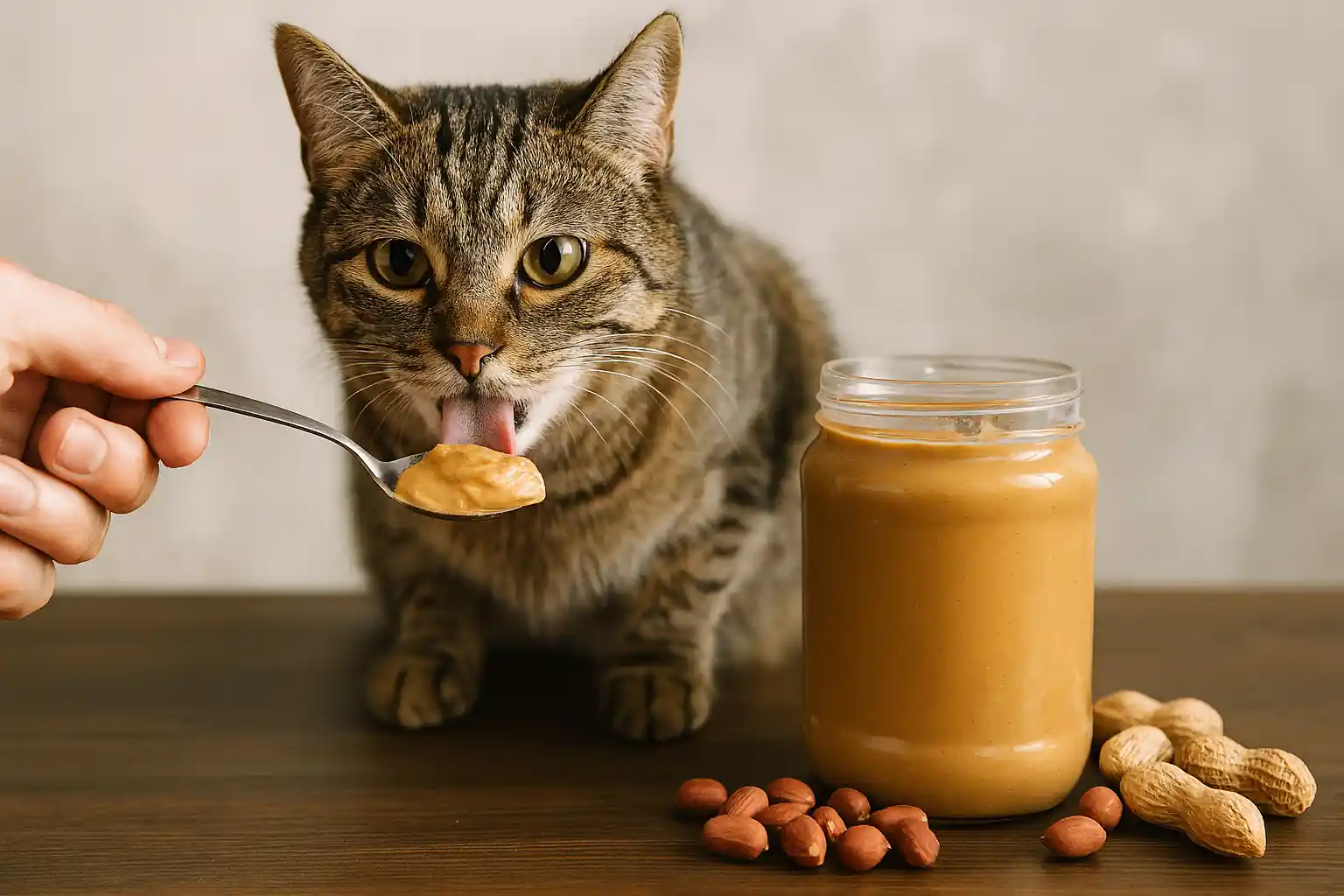Can Cats Eat Peanut Butter? Understanding Peanuts, Cats, and Safety
Peanut butter is one of the most popular spreads for humans, often enjoyed in sandwiches, baked goods, or simply eaten by the spoonful. But many curious pet parents wonder, “can cats eat peanut butter?” or whether it’s safe to let their feline friend lick some off the spoon. This article explores the relationship between cats and peanut butter, looking at the nutritional value, possible risks, safe alternatives, and what to do if your cat has eaten peanut butter. By the end, you’ll know whether feeding peanut butter as a treat is a good idea—or one best avoided.
What is Peanut Butter Made From?
Peanut butter is made from ground peanuts, sometimes with added sugar, salt, and oils. Many brands of peanut butter also include preservatives and sweeteners. While peanuts aren’t toxic to cats, the additives can pose problems. Some brands of peanut butter contain xylitol, an artificial sweetener that is toxic to animals, including cats and dogs.
Butter is made from ground peanuts, and although peanuts aren’t toxic to cats, they provide no nutritional value for cats. Since cats are obligate carnivores, their nutritional needs depend on proteins and amino acids found in meat, not on human food like peanut butter. Pet parents who use peanut butter should carefully check the label before sharing even a tiny amount with their pets.
Can Cats Eat Peanut Butter Safely?
The big question many pet parents ask is: “can cats eat peanut butter?” The short answer is that peanuts aren’t toxic to cats, but peanut butter doesn’t provide any added nutritional benefit. Feeding your pet peanut butter may not immediately harm them if it is butter that does not contain xylitol. Still, peanut butter could cause issues such as gastrointestinal problems, weight gain, or choking hazard in cats.
Peanut butter safe for cats is rare, since even a small amount of peanut butter may lead to gastrointestinal issues like vomiting or diarrhea. While cats can eat peanut butter in theory, it’s not a good idea to feed your cat peanut butter regularly. The better approach is to stick with cat food that is specifically formulated to meet their nutritional needs.
Do Cats Even Like Peanut Butter?
Cats may or may not like peanut butter. Some cats are curious about human food, while others have no interest. Unlike dogs who enjoy peanut butter and often find it irresistible, cats and may not show the same enthusiasm. Since peanut butter doesn’t align with feline taste preferences or their nutritional needs, many cats simply ignore it.
Cats can eat peanut butter, but just because cats may lick a tiny amount doesn’t mean it should become a regular treat. Feeding peanut butter as a treat with no added nutritional benefit could lead to health problems in the long run. Pet parents should remember that cats can eat peanut butter, but it isn’t a necessary or healthy addition to their diet.
What Happens if Cats Eat Peanuts?
The related question to “can cats eat peanut butter” is whether cats eat peanuts directly. Roasted peanuts aren’t toxic to cats, but they are high in fat and may cause digestive upset. Peanuts are high in fat and calories, which could lead to weight gain and gastrointestinal issues. Eating peanut butter or whole peanuts offers little nutritional value for cats.
If cats eat peanuts, they risk choking hazard due to their size and hardness. A cat peanut butter or peanut snack might seem harmless, but since peanuts are human food, they don’t align with a feline diet. Avoid feeding your cat whole peanuts, as they may cause diarrhea or vomiting. Instead, stick with wet cat food or treats made specifically for cats.
Is Peanut Butter Bad for Cats?
While peanut butter is not toxic to cats, peanut butter bad effects can appear when consumed in larger amounts. Peanut butter is high in fat and sugar, which doesn’t suit a feline digestive system. Peanut butter could upset a cat’s stomach, and consuming peanut butter regularly may lead to weight gain and health problems.
In some cases, peanut butter may contain xylitol, which is toxic to cats. Even if it doesn’t, feeding peanut butter is unnecessary. Cat food offers the right nutritional value for cats, while peanut butter doesn’t. So while peanut butter is not toxic, it is still bad for cats when treated as a regular snack.
What are the Risks of Feeding Cats Peanut Butter?
The risks of feeding peanut butter to cats include choking hazard, vomiting, diarrhea, and gastrointestinal problems. Since peanut butter is high in fat, feeding peanut butter regularly could lead to weight gain and serious health problems. For cats allergic to peanuts, consuming peanut butter could trigger peanut allergies.
Some pet parents give their cat peanut butter as a way to hide medication, but this practice is risky. Peanut butter could cause gastrointestinal irritation, and since it’s a treat with no added nutritional benefit, it doesn’t help cats thrive. Feeding your cat peanut butter, even as a tablespoon of peanut butter, isn’t recommended by veterinarians.
Does Peanut Butter Contain Xylitol and Why is it Dangerous?
One of the most dangerous risks is when peanut butter contains xylitol. Found in many peanut butters, xylitol is an artificial sweetener toxic to animals. Even a tiny amount of xylitol poisoning can be deadly for cats. Like xylitol is toxic to dogs, it can be toxic to cats too. Pet parents should always avoid feeding peanut butter that contains xylitol to their pets.
Xylitol poisoning can lead to vomiting, weakness, or seizures in animals. This is why veterinarians warn against feeding your pet peanut butter unless you are 100% sure it doesn’t contain xylitol. Always consult with your vet before giving your cat any human food that may contain xylitol.
What Should You Do if Your Cat Has Eaten Peanut Butter?
If your cat has eaten peanut butter, first check the brand of peanut butter to ensure it doesn’t contain xylitol. If it does, consult with your vet immediately, as xylitol poisoning can be fatal. Even if the peanut butter doesn’t contain xylitol, monitor your cat for vomiting, diarrhea, or gastrointestinal issues.
Cats to eat peanut butter occasionally may be fine, but if your feline friend shows signs of distress, avoid feeding your cat peanut butter in the future. Feeding peanut butter could upset their stomach, and since peanut butter doesn’t provide nutritional value for cats, it’s better to rely on safe for cats to eat foods designed specifically for them.
Should You Ever Give Your Cat Peanut Butter as a Treat?
Some pet parents wonder if they can give your cat peanut butter just once in a while. While cats can eat peanut butter in theory, giving your cat peanut butter doesn’t provide nutritional needs or value. Peanut butter provides calories but no added nutritional benefit for cats. A small amount of peanut butter may not harm them, but peanut butter doesn’t improve their diet.
Cats to eat peanut butter is not necessary, and since peanut butter and jelly, peanuts, and peanut butter could upset their digestive system, avoid feeding your cat peanut butter altogether. Instead of peanut butter, you can offer treats for cats that are healthier and formulated for their nutritional needs.
Healthier Treat Options Instead of Peanut Butter for Cats
Instead of peanut butter, pet parents can provide treats for cats such as wet cat food, all-natural cat treats, or even small pieces of cooked meat. Foods to avoid feeding include peanut butter, grapes, chocolate, and onions, which are toxic to cats. Peanut butter may seem harmless, but it is a treat with no added nutritional benefit.
Healthier treat options that align with feline nutritional value for cats include small portions of tuna, chicken, or specialized cat food snacks. Feeding your pet foods like peanut butter could lead to unnecessary health risks, while choosing healthier treat options ensures they eat a variety of safe foods.
Peanut Butter FAQs for Pet Parents
-
Can cats have peanut butter? Yes, but only in a tiny amount of peanut butter, and only if it does not contain xylitol. However, peanut butter provides no nutritional benefit.
-
Is peanut butter safe for cats? Peanut butter safe for cats is rare, since peanut butter could cause gastrointestinal irritation and lead to weight gain.
-
Is peanut butter bad for cats? Yes, peanut butter bad for cats applies if given in large amounts or if it contains xylitol.
-
What if my cat has eaten peanut butter? If your cat has eaten peanut butter, monitor them for vomiting, diarrhea, or other gastrointestinal issues and consult with your vet if necessary.
-
Can cats eat peanuts directly? Peanuts aren’t toxic to cats, but they pose a choking hazard and are high in fat, so avoid feeding your cat peanuts.
-
Why do some cats like peanut butter? Cats may be curious about human food, but since peanut butter doesn’t match their nutritional needs, it’s better avoided.
Key Takeaways
-
Peanuts aren’t toxic to cats, but they don’t provide nutritional value for cats.
-
Peanut butter could cause vomiting, diarrhea, gastrointestinal problems, and weight gain.
-
Peanut butter bad effects often come from high fat, sugar, and artificial sweeteners.
-
Some peanut butter contains xylitol, an artificial sweetener toxic to cats.
-
Feeding peanut butter as a treat provides no added nutritional benefit for your feline friend.
-
Cats can eat peanut butter, but peanut butter safe for cats is rare.
-
Instead of peanut butter, feed your cat cat food, wet cat food, or other healthier treat options.
-
Always consult with your veterinarian if your cat has eaten peanut butter, especially if it may contain xylitol.
-
Avoid feeding your cat peanut butter, as it is a treat with no added nutritional benefit and may lead to health problems.

